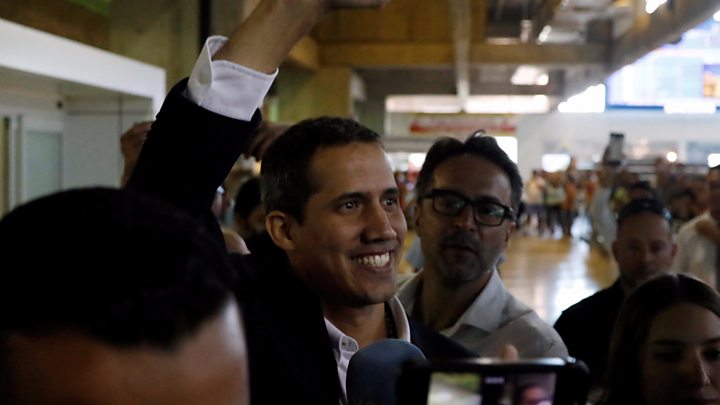
Most of Venezuela has been hit by a continuing electricity blackout that began on Thursday afternoon.
The power cut plunged the capital Caracas into almost complete darkness during rush hour and has extended to the vast majority of the country.
The government of President Nicolás Maduro has blamed the opposition, accusing them of sabotage.
It comes amid heightened tensions over opposition efforts, backed by the US, to remove Mr Maduro from power.
Mr Maduro accuses opposition leader and self-declared interim president Juan Guaidó of trying to mount a coup with the help of "US imperialists".
Mr Guaidó - who is backed by the US, most European and some Latin American countries - said the blackout was a matter of "chaos, concern and indignation" and "evidence of the usurper's inefficiency".
"Light would return" once Mr Maduro was removed from power," he said.
US Secretary of State Mike Pompeo also weighed in, blaming the "Maduro regime's incompetence".
"No food. No medicine. Now, no power. Next, no Maduro," he tweeted.
The lack of electricity has caused flights to be diverted from the main airport in Caracas, where thousands of workers were forced to walk home.
Venezuela depends on its vast hydroelectric infrastructure, rather than its oil reserves, for its domestic electricity supply.
However, decades of underinvestment have damaged the major dams and sporadic blackouts are commonplace.
What's the background to Venezuela's political crisis?
The Maduro government is becoming increasingly isolated as more and more countries blame it for the economic crisis which is crippling the oil-rich country and which has prompted more than three million people to leave Venezuela.

Mr Guaidó, who leads the opposition-controlled National Assembly, declared himself interim president on 23 January and has been at loggerheads with President Maduro ever since.
He has been recognised as interim president by more than 50 countries but Mr Maduro retains the support of his close allies Russia, Cuba and China among others.